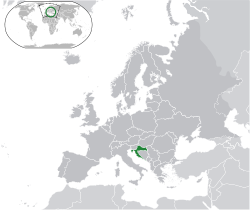Croatia To Introduce Cyrillic Script To Vukovar
By Boris Pavelic
Croatia is to introduce official use of the Serbian language and script into about 20 areas of where Serbs make up more than a third of the population.
Official use of the Serbian language and Cyrillic script will be introduced into about 20 Croatian municipalities where Serbs make up more than a third of the population, officials have announced.
Citing a constitutional provision on minority rights, adopted in 2002, officials said the same provision would apply also to the former war-torn eastern border town of Vukovar, where, according to the 2011 census, 34.87 per cent of the population is Serbian.

Some rightists have protested against the plans applying to Vukovar, owing to the sensitivity of the issue.
Vukovar was besieged and part demolished by the Yugoslav Army and Serbian paramilitaries during Croatia’s war of independence, becoming a symbol of Croatian resistance.
The Party of Rights Dr Ante Starcevic, which has one MP in parliament, said plans to introduce Serbian language and script to Vukovar should be put on hold.
Some war veterans’ associations from Vukovar have also opposed the move, seeking a repeat census in Vukovar.
But the Minister for Administration, Arsen Bauk, told the media that no exceptions could be made. “Laws must be implemented, and we hope that will be the case in Vukovar, too,” he said.
“I want to express government’s decisiveness in implementing the constitutional law on minority rights,” Bauk added.
The coastal region of Istria, near Italy, introduced bilingualism in Croatian and Italian several years ago.
